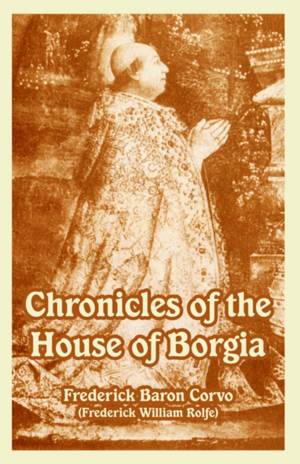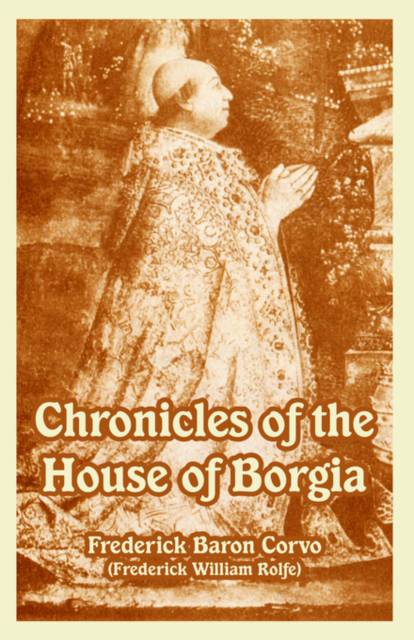
- Retrait gratuit dans votre magasin Club
- 7.000.000 titres dans notre catalogue
- Payer en toute sécurité
- Toujours un magasin près de chez vous
- Retrait gratuit dans votre magasin Club
- 7.000.000 titres dans notre catalogue
- Payer en toute sécurité
- Toujours un magasin près de chez vous
Chronicles of the House of Borgia
Frederick Baron Corvo, Frederick William Rolfe
Livre broché | Anglais
40,45 €
+ 80 points
Format
Description
The author of this unusual work was one of the most enigmatic, eccentric of English writers. He lived and died in poverty, and was as unscrupulous in grasping for money as were the Borgias he wrote about in their grasping for power. He spent his adult life eluding bill collectors and landlords, begging money from friends or strangers, composing fanatically belligerent notes to publishers demanding funds they had allegedly promised him, and extorting money from hapless benefactors whose faith in him proved most often to be unfounded. Nevertheless, he produced several books of superior quality which are sui generis in their vitality, color, and individuality. The present work is an example. It is by no means a work of objective, rigorously documented scholarship; it teems with Corvo's personal hypotheses, prejudices, and grudges. It steadfastly examines every accusation that has ever been made against the Borgias. Yet it conjures up a picture of Renaissance Italy which may not be historically accurate in every detail, but which vibrates with the spirit of the age. The book is broad in scope, relating to the movements of the Borgia Family during the whole of its career as the ruling house of Italy. In a style that is by turn lyric, dramatic, humorous, sonorous and epigrammatic, Corvo traces the lives of Alonso Borgia (who became Pope Calixtus III), Roderigo Borgia (later Pope Alexander VI), the redoubtable Cesare Borgia and his heralded sister Lucrezia, and other lesser known but equally interesting figures of the Borgia clan. The narrative is spiced with illuminating anecdotes, curious lore, and little-known sidelights in connection with the people and events of that incomparable era. Some of the most absorbing passages are those in which Corvo interrupts the narrative to reflect on such matters as calumny (all charges against the Borgias come under this heading), the loneliness of the popes, the classic learning of the Renaissance, the superiority of the 16th-century methods and mores to 20th-century ones, and many other subjects he feels constrained to remark upon. Perhaps the most engrossing chapter of all is the one which examines the matter of poisoning in the light of the superstitions that were still alive during the Borgia era.
Spécifications
Parties prenantes
- Auteur(s) :
- Editeur:
Contenu
- Nombre de pages :
- 416
- Langue:
- Anglais
Caractéristiques
- EAN:
- 9781410225085
- Date de parution :
- 19-10-05
- Format:
- Livre broché
- Format numérique:
- Trade paperback (VS)
- Dimensions :
- 140 mm x 216 mm
- Poids :
- 526 g







